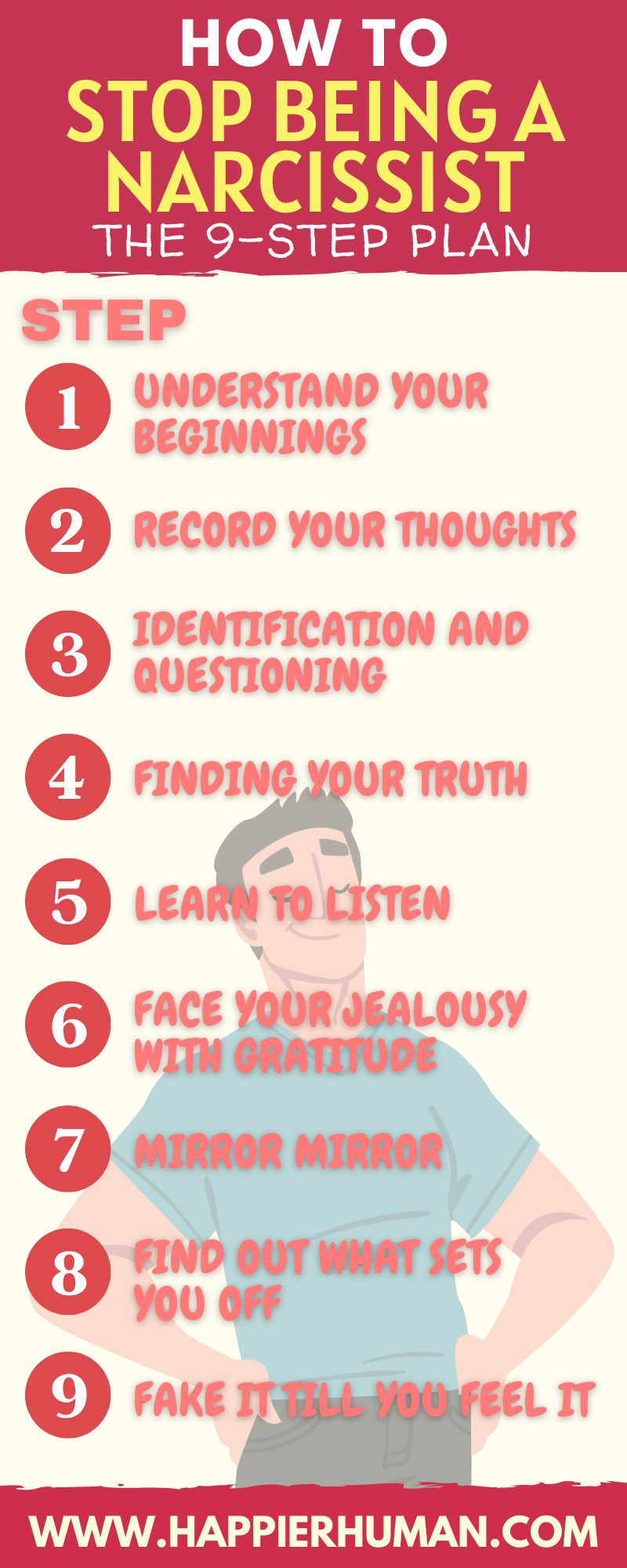Have you looked in the mirror recently and felt ashamed of how you have been treating the people closest to you? Perhaps you’ve realized that your love is conditional and that you like to pull strings to make things happen the way you want.
If this sounds like you, then the thought has crossed your mind: Am I a narcissist?
If you are even wondering about it, there’s a chance you’ve begun to realize your behavior is unacceptable and needs to change. You need to figure out how to stop being a narcissist… and that starts right here.
What Is a Narcissist?
Usually, we see others as being narcissistic. Narcissists leave us feeling abused and used. They may manipulate you, make you feel depressed, and that the world is against you. They pretend to be the only ones who care (even though they run you down, too).
Ultimately, a narcissist is someone who manipulates others for their gain with no consideration of the impact their actions have on the other person. It’s the very definition of being selfish.
Narcissists believe they are blameless and that the world is at fault. They are, after all, perfect.
And while this seems despicable on paper… we all have the potential to become narcissistic, whether consciously or not.

Narcissism is not an all-or-nothing paradigm. It’s more of a sliding scale; we’re all on that scale. Whether or not you are a narcissist depends on how far off the middle line you are.
If you are well-balanced, you have enough empathy to cancel out the narcissistic tendencies you may have had. However, if you move further away from the empathy side of the scale, you start dipping into narcissism.
In the end, you may find full-blown psychopaths that could have started as narcissists. While narcissists don’t always become psychopaths, there is a strong correlation between narcissism and psychopathy.
But don’t worry, if you are reading this guide with the genuine desire to change your narcissistic ways; then you aren’t an all-in narcissist or psychopath… because they can’t even consider they may be less than perfect.
Inborn Narcissist Characteristics
Some narcissist characteristics seem to be genetic, or you may merely be born with a predisposition toward specific behavior, which is then aggravated by your experiences during childhood and as an adult. Inborn narcissist traits include:
These behavior traits may be present in someone who isn’t a narcissist, but they do increase the likelihood that, with the right (or wrong) stimulation, you may become a narcissist.
Learned Narcissist Characteristics
When your childhood home and school experiences stimulate these inborn characteristics, your chances of becoming an actual narcissist increase. Perhaps your parents were gaslighters, and you’ve acquired that streak of manipulation from them.
You may then begin to display the following characteristics:
Signs That I Am or May Be a Narcissist
You may have noticed a few of the following signs that could indicate you have a narcissistic personality disorder.
9 Steps to Stop Being a Narcissist
If you believe you may be a narcissist or have strong tendencies towards becoming a narcissist, the only way you will change is, to be honest with yourself and acknowledge the need to change.
Fortunately, there are steps you can take to stop your narcissistic behavior and reform your self-entitlement beliefs.
1. Understand Your Beginnings
The first step is to start at the very beginning. Where did your first dose of narcissism come from? It’s more than likely it stemmed from your childhood.
It’s time to explore where it started. When did you start believing you were better than others? Did the pivotal people in your life influence you toward grandiose beliefs?
By self-reflecting, you can get to the root cause of where your narcissistic personality was formed.
Action Step: Reflect
Use a journal to reflect on your childhood. Digging up your old childhood photos can be an excellent place to stir up memories. If you still feel stuck, engage in some activities you did as a child, such as playing in the grass, drawing with crayons, or listening to music from your childhood. Use your journal to write about life back then.
Who did you interact with frequently? How did the people around you treat you? If you have siblings, how were they treated? How did you feel about yourself at age five?
What were the words and language used when you were growing up? Are some of those words or phrases still sticking in your mind today?
Record everything without judgment. You are simply collecting information, not judging or looking for someone to blame.
2. Record Your Thoughts
Our thinking takes the form of a little voice inside us, and when we are busy living, we don’t always know what that voice says, and the words are hidden from our more self-aware, reflective side.
What you think informs how you act. Narcissist behavior starts with thoughts. You may not even be aware of these thoughts. After all, you’ve had them for such a long time.
Action Step: Record Thoughts and Thinking
Still using your journal, take three pages daily and write down the first things that come to your mind in the morning. You can do this activity during breakfast or your morning commute on the train.
Initially, don’t bother reading what you write or trying to edit sentences. Record and write. Do this for the first week, then expand it to record your thoughts whenever you get a moment at work or during your leisure time for the next week.
3. Identification and Questioning
This step is tricky. Please don’t skip it.
Using a highlighter, mark sections in your journal that you wouldn’t accept in others. If you recorded that you were told as a child you were better than your friends or that you were only loved when you performed the best, then ask yourself if you would want someone to raise your child like this.
Identify where negative thinking may have cropped up that prompted jealous behavior.
Action Step: If It Was Someone Else?
Consider your morning reflections. Which thoughts would you not say aloud to others? Deep inside, you know which thoughts are pleasant and which aren’t. Ask yourself if you’d accept these thoughts if someone else told you.
Finally, consider the record of your daily thoughts. How would people react if they could hear your thoughts? If someone you didn’t like said these thoughts to you, how would you feel?
Next to each thought you highlighted, use a different colored pen and write, “Is this true?”
4. Finding Your Truth
Narcissists tend to believe their lies. Finding your truth is about being entirely realistic, giving up on the discussions that have been conditioned into you, and considering that others don’t think or feel the same as you do.

And if you are honest (which is hard for a narcissist), you may admit that you lack self-esteem, and that’s why you lash out at others, manipulate them, and try to lessen their accomplishments with negative comments.
Action Step: Play Devil’s Advocate
As a narcissist, you probably don’t think other people could be right, and you could be wrong. Consider the people in your life. You were probably involved in cases of conflict (we’re all human).
Now, play devil’s advocate. Justify their actions or view of things at the cost of yours. Consider how they may be right, and you could be wrong. Write down the argument in their favor.
5. Learn to Listen
Narcissists don’t value what other people think or say. They often jump to conclusions about what people are saying. It’s time to learn to listen and hear others.
Action Step: Paraphrase What Others Say
When listening to the people around you, take a moment to repeat what they said in your own words. This activity involves listening and understanding what the person said. If you feel embarrassed to do so publicly, you can practice this skill while watching TV.
If you have a person you trust, you can start doing this and ask them to confirm whether your paraphrasing was correct or if you lost the meaning of what someone said.
Try to rephrase (not just repeat) what someone said accurately. This activity is about seeing things from the other person’s perspective.
6. Face Your Jealousy With Gratitude
To some extent, jealousy and envy are normal feelings. We all look at someone who has more than us and feel envy—we wish we had that fancy car, expensive house, or beautiful partner, too.
But a narcissist takes things one step further by actually pretending they have those things, too, failing to see what they have (and don’t have). Narcissists lack genuine gratitude.
Action Step: Develop Gratitude
Make a list of all the things you can be proud of. Don’t look at your neighbor or colleague’s “list.” This is about you and what you have.
Next, think about what you have to be grateful for. You may not have a lovely house like your boss, but you have a home where others live on the street. So, for each item on your list, write what you have and why you should be thankful for that item.
Now, practice gratitude. When you feel envy rearing up or feel yourself about to make a jealous remark, stop, think, and remember. You have blessings, too—real blessings, not imagined or associated blessings.
What you have, probably “less” than you’ve been pretending to have, is enough. Whether in a tiny walk-up apartment or a three-bedroom house, your home is enough. Your family is enough. You are enough (without envy or pretense).

7. Mirror Mirror
Narcissists have an inflated sense of self that becomes pure arrogance. Yet, there is no reason for any of us to be arrogant. Seeing yourself and acknowledging that you’ve been arrogant is the first step in recovering humility and functioning normally.
Action Step: Soul Gaze
In this activity, take a mirror and sit quietly. Look into the mirror and see yourself. Notice your eyes, the shape of your ears, your nose, mouth, and cheeks. Now, look deeper.
See your different expressions, how your face moves, and what shows in your eyes when you are happy, sad, or angry.
Now, keep your face still and look deep into your eyes. Notice yourself. See yourself. You are beautiful, human, and flawed.
Yes, the idea here is to realize you are flawed. Your face is not symmetrical, and you have near-perfect skin. Yet, this is you. All of you, it’s who you are, flaws and all. There is no reason to be haughty or arrogant. You are enough as you are without having to try and be better than anyone else.
8. Find Out What Sets You Off
Narcissists often struggle with a trigger. It’s usually a pet peeve that sets them off and gets their narcissistic tendencies going.
Perhaps you look at others and feel they are mediocre, but then, when other people enjoy success, you become overwhelmed with jealousy and begin to act out. You may react by spreading rumors, running someone down, becoming enraged, or getting violent.
Action Step: Identify Your Fuse and Find a Defuse
Think back to all the times you’ve felt jealous and could have completely lost it when someone did something that annoyed you. What was it that annoyed you? Was it because they enjoyed success?
Did you experience a moment in your childhood when this happened to you? Perhaps someone was chosen as the winner or did well in a task, and you were overlooked despite having tried your best? How did that feel when you were a child? Could you celebrate with that child?
Probably not.
Now, as an adult, you get set off by the success of others because you feel like your own successes aren’t valued and your efforts aren’t appreciated. Even when people do fawn over you, it still isn’t enough.
In your journal, write a short note to that child-you, explaining that you see them, you value them, and they are enough as they are. It’s okay to let go of envy, jealousy, and any other feelings that trigger your narcissism to flare.
Whatever the trigger, trace it back to the beginning and find out why it sets you off. Now, diffuse it by reminding yourself that you are enough and successful in your own right.
9. Fake It Till You Feel It
When you were conditioned toward becoming a narcissistic adult, your childhood would have been deficient in empathic stimulation. You don’t know or understand how other people feel.

When you see someone cry, you struggle to understand their feelings. After all, it’s their feelings, not yours. But when you feel upset and cry, you expect everyone to support you (if you’re honest, you’ll have to admit to this, right?).
Building empathy is something that can be done in later life. While it’s not as natural as when you develop empathy as a child, it can and does help you connect with others on a more equal and human level. This is something that narcissists desperately struggle with.
Action Step: Program Empathetic Responses
Learn about the people in your life. Find out about their likes, dislikes, fears, and hopes. Get a real feeling for what they are like and how they think. Notice how they react in different situations. Do they get angry often? How do they deal with frustration?
Now, decide what is an acceptable and passionate response to the typical situations where you’d typically act selfishly.
Visualize that response in detail. When the situation crops up that requires that response, you will be prepared for it. While this may seem incredibly false and irrational, it’s a way to rewire your brain from old harmful habits.
Final Thoughts on How to Stop Being a Narcissist
Being a narcissist is about being selfish and not considering others. And because someone with strong narcissistic tendencies also lacks genuine empathy, they don’t see it as being a problem when they abuse others so they can gain something.
However, if you are not yet completely off the scale of selfish behavior, you may still be able to see how your behavior isn’t acceptable or right. You may have it in you to look for help to guide you toward more empathy and understanding, which will help lessen those narcissist outbreaks and tantrums.
With the steps explained above, you may be able to reverse the effects that your narcissistic tendencies have on you and those around you. However, if you are finding these steps still don’t help, it may be time to seek professional help from a trained therapist who can guide you through the process of psychotherapy and neuro-linguistic reprogramming.
You may also be interested in learning more about where empathy starts. Why not read our guide on kindness activities for kids?
See more posts about how to handle narcissists in your life:
- 13 Narcissist Traits, Characteristics, & Warning Signs
- 10 Revealing Reasons You Are Attracted to Narcissists
- 19 Weird Things That Narcissists Do to Manipulate People
- 12 Important Strategies to Use When Divorcing a Narcissist
- 11 Reasons Narcissists Will Breadcrumb and Manipulate You


